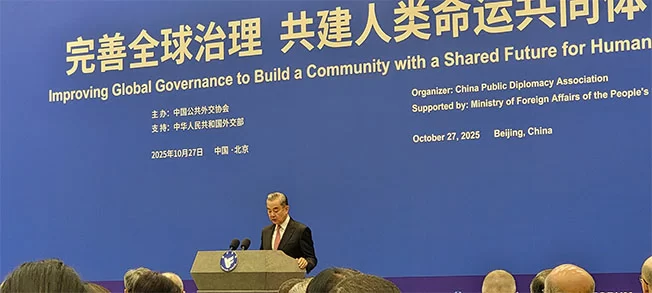At the 23rd Lanting Forum in Beijing, Chinese Foreign Minister Wang Yi introduced the Global Governance Initiative (GGI), positioning it as a cornerstone of China’s contribution to reforming and strengthening global governance. In his keynote address on October 27, 2025, Wang emphasized the critical need for multilateralism, solidarity, and collaboration to address escalating global challenges and build a shared future for humanity. He highlighted the 80th anniversary of the United Nations (UN) as a reminder of the UN’s central role in maintaining global peace and development, while warning against the rise of unilateralism and the urgent need for governance reform. The GGI, championed by President Xi Jinping, is built on five core principles: sovereign equality, international rule of law, multilateralism, a people-centered approach, and tangible results. Wang asserted that the initiative not only aligns with the UN Charter but also represents an innovative step toward a more just, inclusive, and effective global governance system. Supported by over 140 countries and organizations, the GGI calls for unity in a world increasingly fragmented by division. Wang stressed that only through cooperation and shared efforts can sustainable peace, development, and prosperity be achieved. He cautioned against the politicization of economic and trade issues, warning against market fragmentation and trade wars. Wang underscored the importance of prioritizing development on the global agenda, advocating for equitable partnerships and mobilizing global resources. China’s commitment to high-quality cooperation, exemplified by initiatives like the Belt and Road, has already benefited over three-quarters of the world’s nations. The speech also addressed key priorities such as strengthening the UN, promoting sustainable development, combating climate change, and amplifying the voices of developing nations. Wang reiterated China’s dedication to active participation in international cooperation and reform, particularly in support of the Global South. He concluded with a call for collective action and open dialogue, reaffirming China’s resolve to work with the international community toward a fairer and more stable global order. Following Wang’s address, discussions featured prominent voices like Omar Razzaz, former Prime Minister of Jordan, who likened the current global situation to a ‘law of the jungle’ and called for UN reform. Erik Solheim, co-chair of the Europe-Asia Center, advocated for greater Asian representation in the UN, while Lin Yifu, former dean of Peking University’s National School of Development, warned of the escalating tensions between the US and China and emphasized the need for soft power over hard power.
China presenteert Global Governance Initiative als antwoord op wereldwijde uitdagingen
